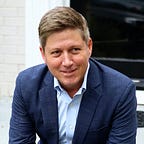Bono, U2, Springsteen and an All-Encompassing “Yes.”
On seeing U2 at The Sphere.
In his upcoming book There Was Nothing You Could Do, which is about how Bruce Springsteen’s “Born in the U.S.A.” album changed both his career and musical superstardom in general — a book I was honored to be asked to provide a blurb for — author Steven Hyden writes about how Springsteen, when he exploded onto the scene, allowed rock critics a narrative link between Elvis Presley and Bob Dylan. “For the (mostly white male boomer) music critics of the eighties, Bruce was a vessel into which they could pour their admiration for those older legends,” Hyden writes. “It was as if they had found the perfect rock star — he could move like Elvis and write like Dylan. The pelvis and the brain had finally been fused into one.” But there’s a pivotal moment, after Springsteen released “Nebraska” and “Darkness on the Edge of Town,” when Springsteen chooses sides. As Springsteen told the story when he inducted Dylan into the Rock and Roll Hall of Fame, the first time he heard Dylan’s “Like a Rolling Stone,” he was in car with his mom. She turned to him: “That guy can’t sing.”
